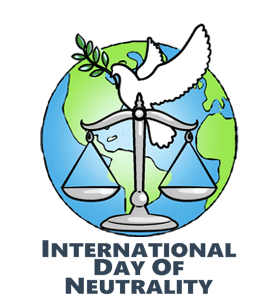International Day of Neutrality
Quick Facts in Australia
| HashtagsCompiled on | #Internationaldayofneutrality |
|---|---|
| Related Hashtags | #Neutrality |
| 2024 Date | 12 December 2024 |
| 2025 Date | 12 December 2025 |
2024 Holidays & Dates - Australia
| Australian & Common Holidays | ||
| Misc. & Int'l. Observances | ||
| Christian Holidays | ||
| Jewish Holidays |
› | ||
